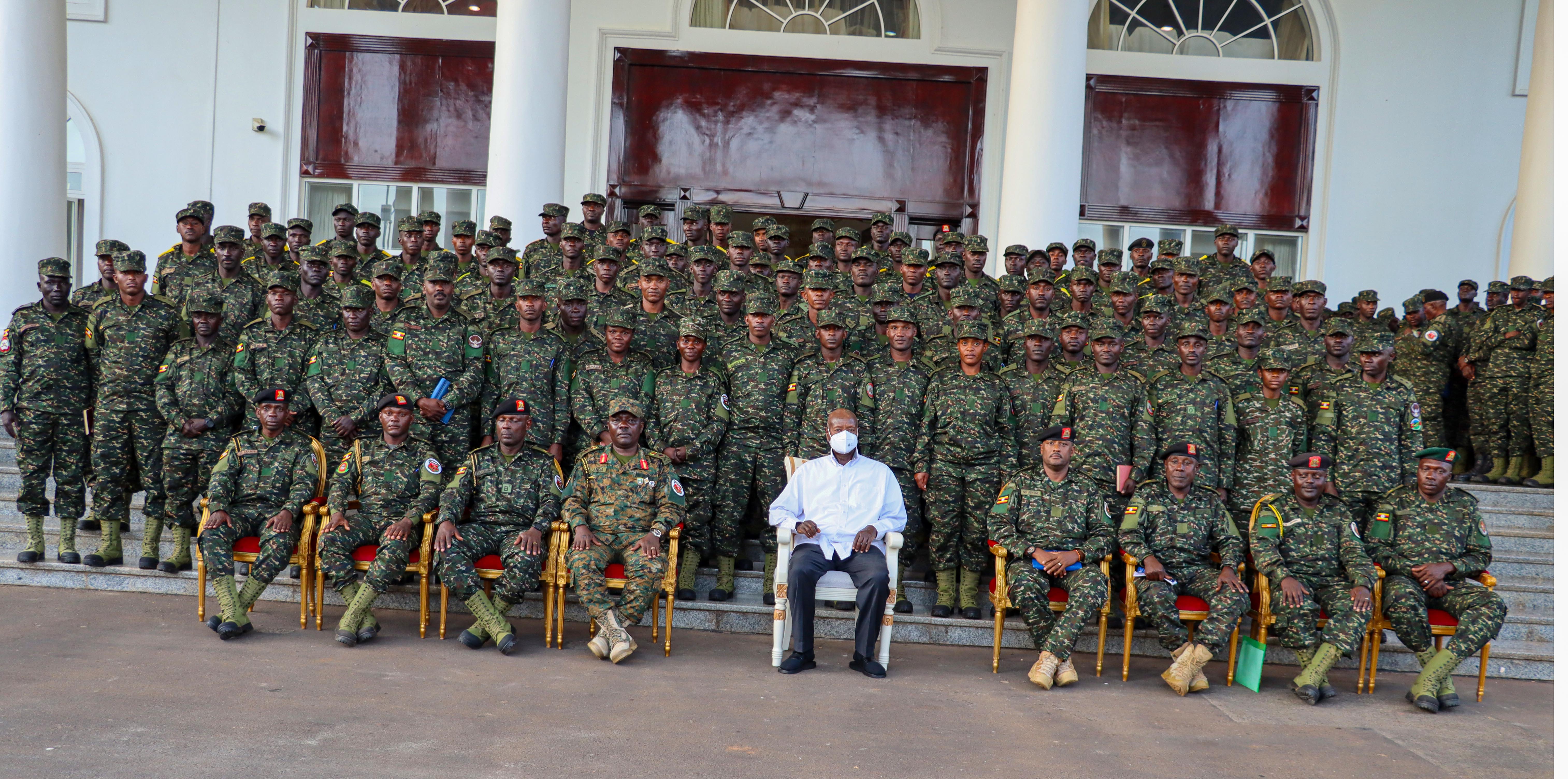Museveni Urges Army Officers to Promote Prosperity, Strategic Security

President Museveni has called on UPDF officers and students undergoing various courses at the Armoured Warfare Training School - Karama, Mubende District to protect Uganda from the divisive politics of identity.
The president says politics of identity undermines national unity, and urged them to engage in the
country’s socio-economic transformation by promoting prosperity through the production of goods and services.
Delivering a lecture of opportunity at State House Entebbe, President Museveni who is also the Commander In Chief of the UPDF, cited the harmful impact of identity politics in most African nations, notably citing the historical fall of Africa to colonialists that resulted in a significant political and economic decline.
“In the last 500 years, Africa has been through so many problems, slave trade, colonialism, and neo-colonialism. All this was happening because the governance of Africa was weak and lagged, consequently allowing Europeans to take control.”
The president expressed satisfaction at the gathering, stating the importance of discussing the UPDF’s role as an instrument of revolution in Uganda and Africa, emphasizing the need for attendees to understand this mission.
Taking them through the historic European colonization of Africa, the president hinted at its negative impact on African economic development, Uganda inclusive, and urged them to focus on national
interests.
Recalling how Africa had gone through neo-colonialism, causing economic collapse, President Museveni pointed out that upon coming to power, the NRM Government introduced three historic missions
(prosperity, strategic security, and brotherhood) and four ideological principles (Patriotism, Pan-Africanism, Socio-Economic Transformation, and Democracy) resulting in the revival of the economy.
The president also urged the army officers to rethink prosperity through self-sufficiency, saying that true economic growth does not depend on aid but on local production and entrepreneurship (producing a good or service and selling it with ekibaro), communities can generate income, improve living standards, and access essential resources like housing, transport, electricity and clean water.
“You can’t get prosperous from aid, if we were to get prosperous, Africa would be rich, even other countries like Latin America have been getting aid but they are very poor. The only way you can get prosperous is to produce a good or a service and you sell it with ekibaro and this will help you to get good money to live a better life.”
President Museveni further warned the officers against tribalism and emphasized the need to expand markets beyond Uganda to ensure economic prosperity, advocating for a Pan-African and patriotic
approach.
He cautioned that producing similar products without sufficient market creation could lead to oversaturation and devalue those goods.
“For instance, if you go to Orom, you will find that everyone is producing simsim. However, Opio cannot buy from Ochen, and Ochen cannot buy from Opio. So, who will rescue them? The people of Kampala, who do not produce simsim,” he said.
“Currently, Uganda is producing 700,000 metric tons of sugar, yet the entire country consumes only about 300,000 metric tons, leaving a surplus of 400,000 metric tons. This means that the sugar market is more of a Ugandan market than solely a Busoga market, where sugarcanes are produced.”
Similarly, the president said that dairy production is at 5.4 billion liters, with domestic consumption of only 800 million liters, resulting in a surplus of 4 billion liters.
He encouraged the participants to work towards a deeper appreciation for Uganda, East Africa, and Africa in order to create a wider market and seize opportunities within the continent.
“The milk we are producing within Uganda is 5.4 billion litres, consuming 800m litres, having a surplus of 4 billion litres” he said.
However, he was happy to note that the country has exported 2,100 metric tons of high-quality powdered milk to Algeria, highlighting its growing market potential.
He further clarified that It is important to avoid tribalism much as tribes are significant and focus on unity rather than identifying themselves as Ekyetu, Ebyaffe, Abanambi, or Mewa, etc, because the idea that prosperity for all comes from tribal affiliations is a misconception.
“While tribal groups can collectively produce high-quality products, they may struggle to purchase large volumes.”
On the issue of sustainable development, the president noted that as Uganda's economy advances, the call for innovation and progress should become increasingly crucial to foster economic transformation.
In addition, President Museveni said families must transition from relying on manual labour and embrace skilled work and machinery, emphasizing sustainable development likening it to a pregnancy that involves change and growth.
“All families in Uganda must undergo an economic transformation, from using human manual muscle to do work, which is the problem in Africa. We need to shift from muscle power to mental labour of skilled and machine work.”
“Here in Africa, you hear people saying sustainable development, without transformation? Can you have a sustainable pregnancy? Life goes through change; pregnancy must transform, you cannot stay the same all the time.”
President Museveni used this analogy to emphasize that just as a pregnancy involves change and growth, so too must the approaches to economic and social development evolve.
During the discussion advocating for strategic security through regional integration, President Museveni emphasized the need for Africa to draw upon its historical resilience against slave trade, colonialism, and neo- colonialism and secure itself from contemporary threats.



0 Comments